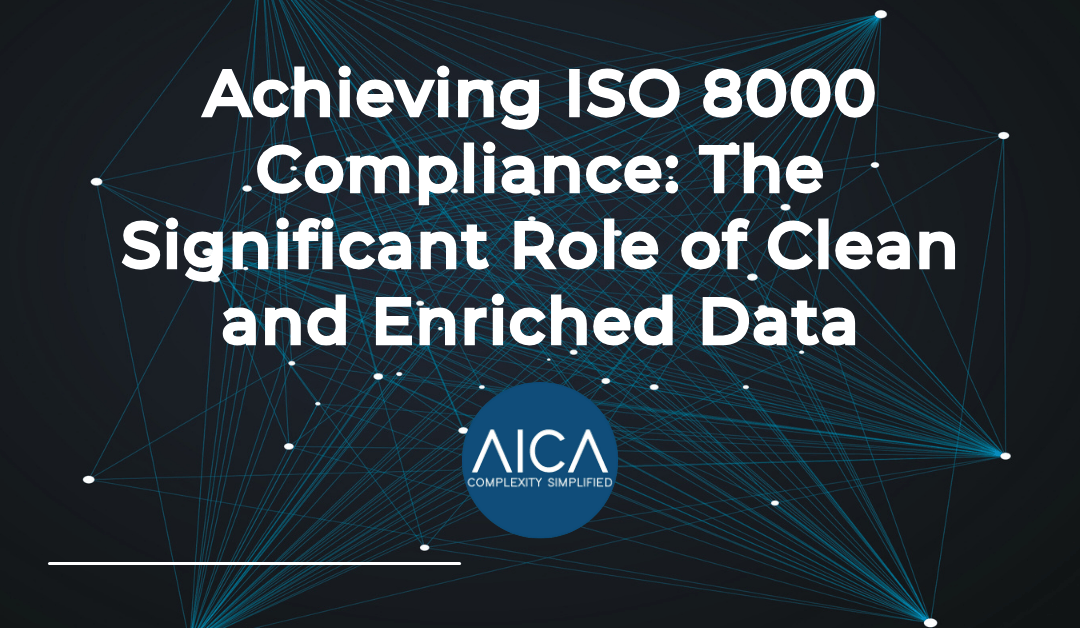The quality of product and service data can make or break your company’s success. As organisations increasingly rely on data to enhance decision-making, operational efficiency, and strategic planning, the necessity for maintaining high-quality data has never been more paramount.
ISO 8000, the international standard for data quality, which offers a framework for organisations to ensure their data assets are accurate, complete, and fully usable.
What is ISO 8000?
ISO 8000 specifies requirements for the quality of data and provides a comprehensive set of guidelines for managing data provenance, accuracy, exchange formats, and completeness.
It serves as a benchmark for organisations to measure the quality of their data, ensuring it is fit for purpose and capable of supporting business objectives effectively.
By adhering to ISO 8000, your company can achieve a level of data quality that enhances operational efficiency, reduces costs, and facilitates compliance with regulatory requirements.
Why is it Important for Companies to Comply?
Compliance with ISO 8000 is not just about meeting a set of standards; it’s about embracing a culture of data excellence that can significantly impact an organisation’s bottom line.
High-quality data underpins effective decision-making, drives innovation, and enables companies to respond more quickly to market changes.
ISO 8000 compliance also facilitates smoother interaction within global supply chains, making it easier for companies to export or import products and services to countries that recognize and endorse the standard.
Some of These countries include:
– China
– Japan
– Germany
– South Korea
– United Kingdom
– United States
This interoperability is crucial for businesses looking to expand their reach and compete in the international arena.
The Effects of Not Complying
The consequences of ignoring ISO 8000 compliance can be severe. Organisations may face operational inefficiencies, increased costs due to data errors, and lost opportunities.
More critically, non-compliance can hinder a company’s ability to engage in international trade, especially with countries that have adopted ISO 8000 as a prerequisite for doing business.
This limitation not only impacts revenue but also restricts access to global markets, putting companies at a significant disadvantage compared to their compliant competitors.
How AICA Can Facilitate This Compliance
AICA specialises in product and service data cleansing, enrichment, comparison, and creation, playing a pivotal role in helping organisations maintain the quality of their data in line with ISO 8000 standards with the help of the ECCMA.
Our services are designed to ensure that your data is not only accurate and complete but also fully optimised to support your business objectives.
Cleansing
Through our automated data cleansing processes, we eliminate inaccuracies, redundancies, and inconsistencies, ensuring your data is precise and reliable.
Enrichment
Our enrichment services add value by enhancing data with relevant attributes, classifications, and translations ensuring that your product data is useful for decision-making, operational processes and international trade.
Our ML algorithms and industry expertise deliver services that not only achieve compliance but also unlock the full potential of your data assets.
Conclusion
Achieving ISO 8000 compliance is not an option but a necessity for businesses aiming for operational excellence and global competitiveness. Clean and enriched data is the cornerstone of this compliance, enabling organisations to leverage their data assets confidently and effectively.
If you’re ready to overcome poor data quality and achieve ISO 8000 compliance, AICA and the ECCMA are here to guide you through the process.
Contact us today for a demo or data quality report, and take the first step towards unlocking the full potential of your data.
Copyright Reserved © AICA Data International Ltd 2023
